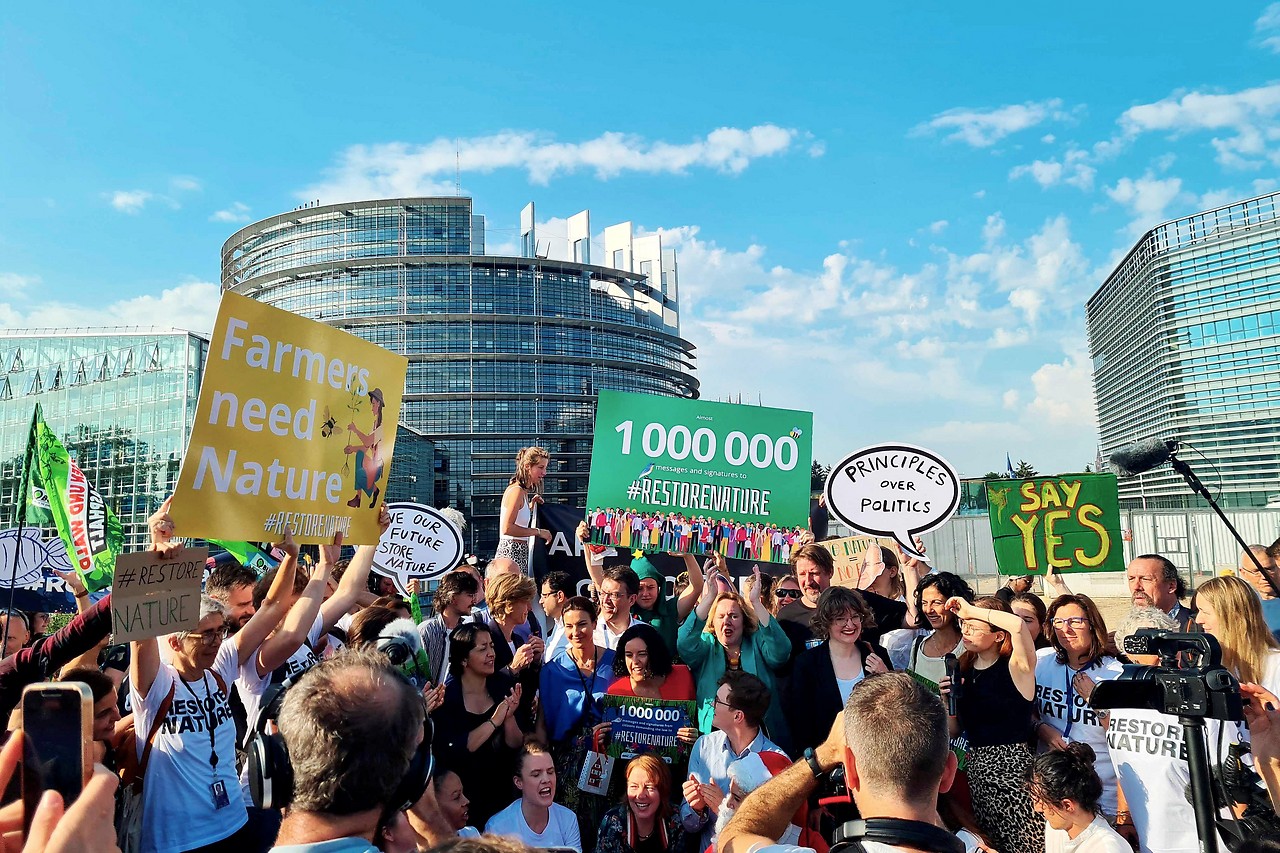With Parliament’s approval, negotiations can now begin with participating EU countries as well. They had agreed on a good position on the project three weeks ago. A final compromise must now be found for the new requirements to take effect.
No legislative proposal in the past had caused such a violent exchange of blows in advance. This was also made evident in June in the Environment Committee of the European Union Parliament. The vote in the committee was 44 to 44 – which, for lack of a majority, amounted to a recommendation to reject the plenary session of Parliament.
The European Parliament votes on the Reorganization Act
On Wednesday, the European Parliament voted in favor of passing an EU law on restoring nature.
Demonstrations from both sides in Strasbourg
Recently, on Tuesday, supporters and opponents of the legislative plans stood in front of the European Parliament in Strasbourg: on the one hand, he warned “Fridays for the Future” with Greta Thunberg in their midst, and on the other he warned farmers who feared “senseless laws”.
In addition to the right-wing national parties, opponents of the law could have the largest group in the EU parliament behind them. The European People’s Party, headed by Manfred Weber (CSU), has been vehemently opposed to legislation proposed by the EU Commission in the past few weeks.
Alexander Bernhuber, MEP for the ÖVP-EU party, called the result of the vote “a wrong decision” and again called on the EU Commission to once again withdraw the legislative proposal.
We stick to it: We support the restoration of ecological habitats and in many cases we already do. But we have to correct this law: the committee’s proposal will lead to the reduction of farmland and forests because production areas should no longer be used. This means not only massive encroachment on the property of landowners, but also that we will have to import food from countries outside the European Union, ”says Bernhuber.

Otmar Karas, MEP for the ÖVP and the European Union, appealed to the European Union Commission on Wednesday to submit a revised proposal for the EU Reorganization Law. “The shorthand that today’s vote of yes or no by the EU Parliament on reorganization is wrong,” says Karas. Biodiversity and the “Green Deal” will not be questioned by the EU Parliament. But Karas said the “controversy was completely derailed”. He sees no chance of compromise.
Solid fronts in the European Union Parliament
Günther Seidl, an EU Member of Parliament from SPÖ, called the vote “a real nail-biter”. Now you can finally breathe a sigh of relief. The victory achieved is a true victory for nature and our future. Today, it was about more than just one law: the Reorganization Act was taken hostage by the EPP and like an attempt to end the whole Green Deal. For a long time now, It is no longer about content, but about pure election campaign strategy at the expense of our environment.
European Green Deal
The European “Green Deal” provides for an EU-wide reduction in emissions to zero by 2050. The target is legally binding in the EU climate law. By 2030, net greenhouse gas emissions will be reduced by at least 55 percent compared to 1990 levels.
According to the Austrian Freedom Party delegation, they were going to reject any proposal. Roman Haider, a liberal member of the European Parliament, warned that the project would dispossess farmers and cause food shortages. As a result, it is now “a black day for Europe and its citizens”. “It was a serious blow to food security and agriculture in Europe,” Haidar said.
On the other hand, Thomas Weitz, MEP for green environment, expressed his pleasure “because, despite the ÖVP’s disinformation campaign against environmental protection, the progressive majority has developed the law.” The law is “important to the survival of all of us.” According to Waitz, it is “not only about habitats for animals and insects or local recreation areas for people, but also about protection from environmental disasters and timely climate adaptation measures.”
Claudia Jamon of NEOS MEP welcomed the agreement. “Renormalization is a big and important step for Europe, for a joint effort by all EU countries to prevent the collapse of ecosystems and the associated catastrophic effects on all of us. We are very pleased that the besiegers, primarily the European People’s Party and thus the ÖVP, have not succeeded in sabotaging our fight Against the impending climate catastrophe.
Gewessler and environmental organizations are pleased
Climate Protection Minister Leonore Goessler (The Greens) welcomed the vote in the European Union Parliament. “The EU Law on Natural Reconstitution is an important step towards protecting our environment. It ensures that we give nature space to develop and makes sure that we do not destroy and protect more and more areas, but we protect them.” She expressed her confidence that the upcoming negotiations between the European Union Parliament, the Council of the European Union and the European Union Commission would reach a quick conclusion.
Environmental organizations were also pleased with the outcome of the vote. “The vote in the EU Parliament on the Reorganization Act today marks an important milestone for nature and people in Europe. Through the Act, important habitats for endangered animal and plant species can be restored, the climate can be improved, and ultimately healthy nature can be secured as a valuable foundation for us all.” .
“Even if the proposed law is weakened, this is a significant milestone. Restoring nature is one of the most important tasks of our generation,” said Joschka Prangs, spokesperson for biodiversity for the WWF. GEP 2000 commented: “The EPP’s attack on Protecting the environment and nature.” “By approving the EU Reorganization Act, the European Parliament clearly rejected the disinformation campaign of the European People’s Party. Granted, it was characterized by misrepresentations and “fake news”.
against man-made climate change
According to the EU Commission, the proposed legislation should improve biodiversity and thus counter man-made climate change. According to the Commission, more than 80 percent of protected habitats in the European Union are in poor condition. The proposed law calls for at least 20 percent of the EU’s surface and marine areas to be reconstituted by 2030. By 2050, all ecosystems requiring re-saturation must be restored. As is often the case with EU legislation, it is up to the Member States themselves to develop appropriate measures.
However, the specification must not only explicitly affect nature conservation areas, but also cultivated areas such as forests, fields and urban areas. For example, green space in cities is expected to increase by five percent over the next three decades. Pesticide use will be greatly reduced and completely banned in “sensitive areas”. Monocultures must be brought back and drained, and swampy areas used for farming restored.
In June, Austria abstained in the EU Council of Environment Ministers. Environment Minister Leonor Gossler (Grenz) justified this with the position of the federal states responsible for environmental protection in Austria. The nine countries had previously opposed the EU Commission’s plans.

“Food practitioner. Bacon guru. Infuriatingly humble zombie enthusiast. Total student.”








More Stories
Kyiv: Russian Kursk offensive halted
US Presidential Election: Former US Government Officials Warn Against Donald Trump's Election
Netherlands wants to leave asylum system